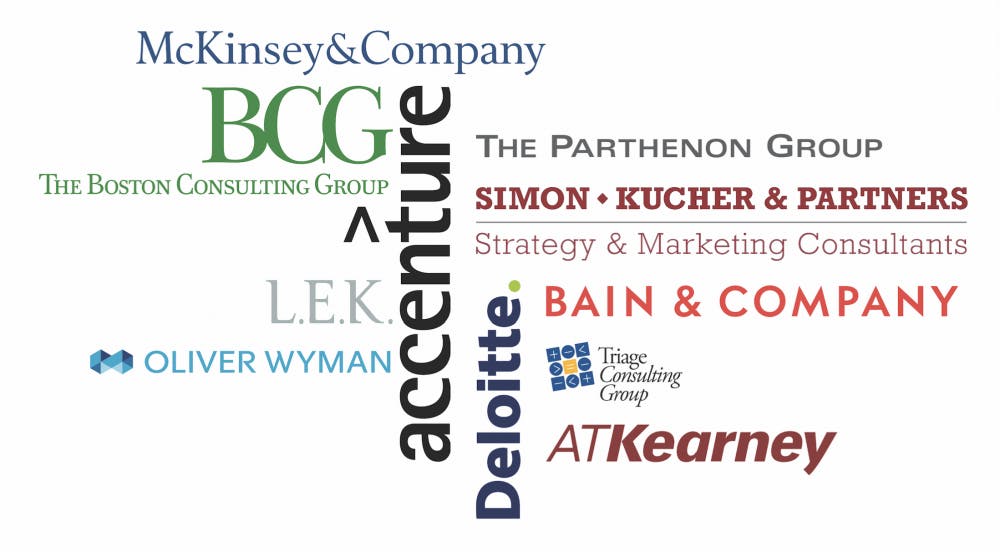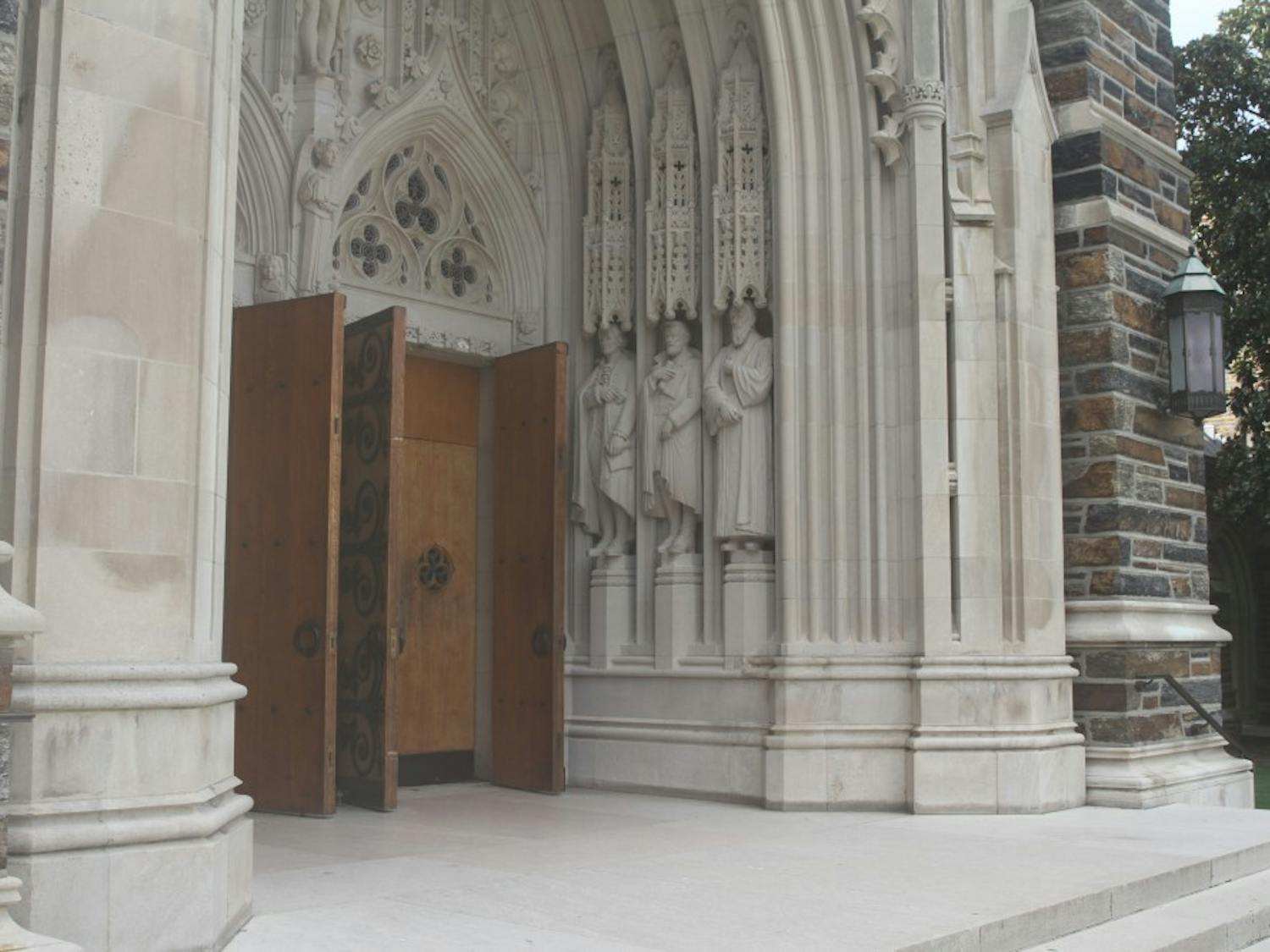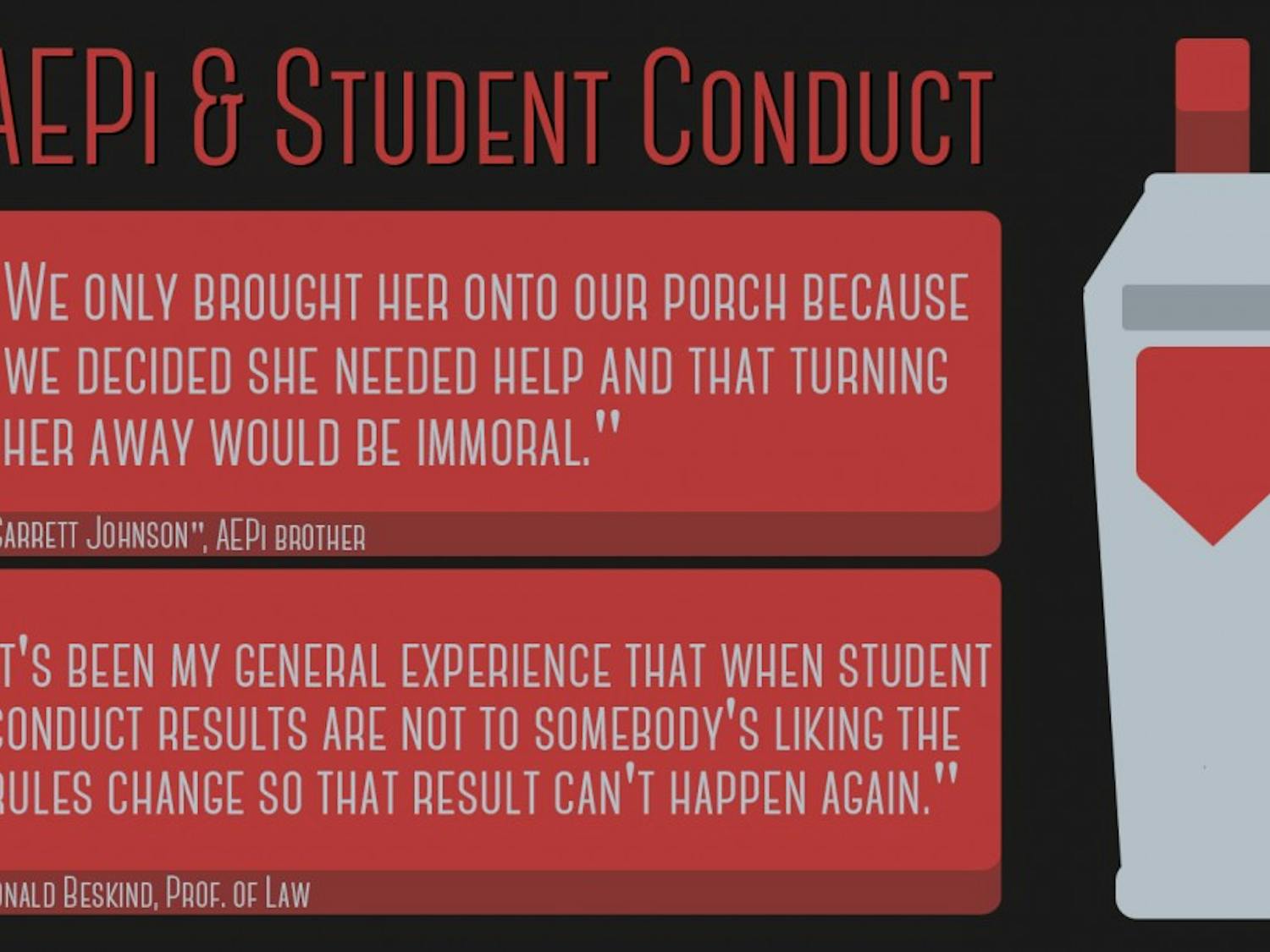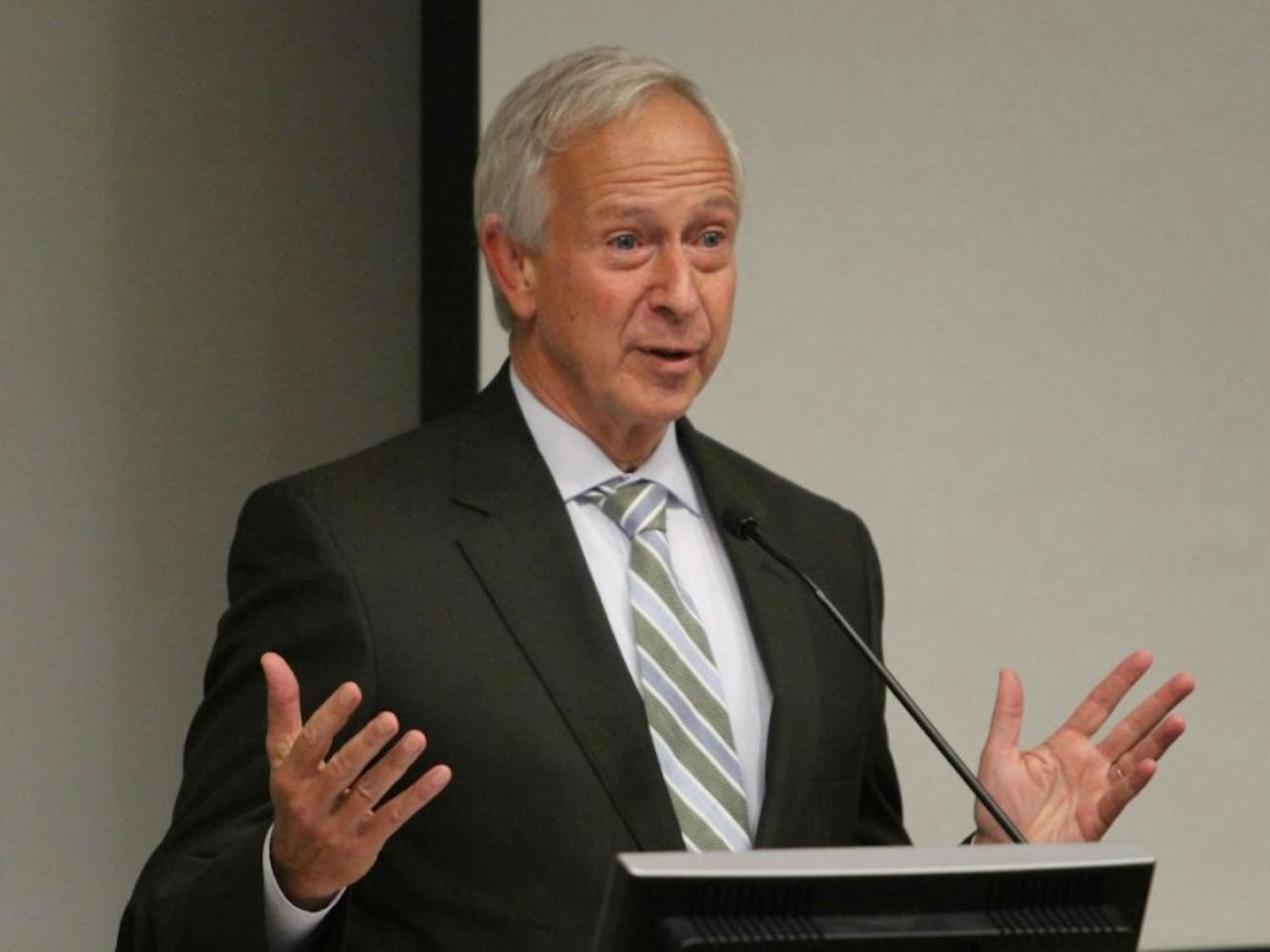Senior Izzy Marie* was sitting in her final round interview with a top consulting firm when she had a revelation.
The firm had flown her to Washington, where a senior consultant began an interview with a simple question: “Why do you want to be here?”
Marie, a political science and computer science double major, had practiced her answer.
“Everyone has,” she said. “You have a 30 second version, a five minute version. You just have it down.”
But there was something different about this time.
“My mind went blank,” she said. “I looked at him, and I could not come up with anything. I didn’t want to be there.”
Marie realized in that moment that she didn’t want to go into consulting.
She said the revelation came “like it was out of a movie,” and her interviewer could also see that she was having serious doubts. Instead of running a case, as is standard, they spent the rest of the interview talking about one of her interests—education policy—and outreach the firm does in Washington.
After she left, she cancelled her other consulting interviews, signed up for an LSAT course and started making plans to enter law school—which had been her goal long before the consulting process began.
“A lot of people who go into consulting really want to be there, but I think there are a lot of people like me who just get caught up in the whole recruiting process and the fact that they make you feel so special and so wanted and so smart,” she said.
Describing herself as a competitive person in a competitive environment, Marie said Duke doesn’t help things by providing so many ways for students to get involved in the consulting and finance fields.
“By the time you become a junior or senior, having a job at one of the prestigious consulting companies definitely is the measure of success,” she said.
‘A loud sucking noise’
The networking starts in August.
In September, there are coffee chats, information sessions and application deadlines. Then the interviews start, and most offers are made by the end of October. The process isn’t long, but it is all-consuming.
“The recruiting program creates this kind of loud sucking noise on campus that attracts students who are very competitive to compete with their most competitive peers,” said William Wright-Swadel, the executive director of the Career Center.
“Often, they don’t know much about it when they first get into it,” he added.
The four most prestigious consulting firms according to Forbes are McKinsey & Company, The Boston Consulting Group, Bain & Company and Deloitte Consulting. All four recruit at Duke.
Wright-Swadel said there is “a strong match” between the skills Duke students have and the skills Wall Street employers and consulting firms seek. But he added that students should be sure the job they are taking is one they want.
“One of the pieces of advice I’ve given to people for many years, particularly to really intelligent, competitive people, is be careful the contest you enter—because you may win something you don’t want and not be able to walk away from it,” he said.
Junior Aron Rimanyi, who went through recruitment for consulting internships this fall, used an analogy to describe the process of attending information sessions and networking on campus.
“At concerts, when people in the front row stand up, that’s great for those people,” he said. “But eventually everyone stands up. And if everyone is standing up at the same time, then that’s just as good as if everyone is sitting down.”
“That’s what happens with recruitment,” the political science and economics double major said.
He explained that some students attend recruitment events less out of genuine interest than because “everyone else is going so you feel like you have to.”
“That means that more and more people are going, so more and more people get sucked in,” he said. “After a while, it’s just as good as if no one went.”
‘We’re looking for people that are really, really smart’
Andy Crewson, Bain’s recruiting team lead at Duke, explained that the company casts a wide net when recruiting on campus.
The lists of organizations that Bain reaches out to on campus is “really long,” said Crewson, Trinity ’09, noting that it includes finance and consulting clubs, some selective living groups—though he did not say which—and Duke’s Association of Business Oriented Women.
“We basically try to communicate and work with any group that we can have a conversation with,” he said.
He added that he could “qualitatively say that the interest in consulting and Bain specifically is quite high” but said that he could not give specifics on the number of applicants or positions offered.
“Duke is certainly a place we’ve had enormous success from,” he said. “That’s why we put a lot of time and effort into getting the best and the brightest to come to Bain. We as a firm put an incredible amount of resources behind that.”
Crewson, who majored in economics and religion at Duke, also said that Bain looks at applicants across a variety of majors.
“What we’re looking for at the end of the day isn’t so much about what you majored in, but we’re looking for people that are really, really smart and have the raw horsepower to do the job and to crack tough problems,” he said.
New consultants will learn the business specifics, he explained, after they arrive at Bain.
Marie—who noted that she thinks consulting is a great career for people who are really interested in it—said that the rhetoric companies use has an impact on potential applicants.
She said that when consulting firms say they don’t care what major you are and just “want smart, logical thinkers,” then it gives students the impression that consulting is the “thing to do” no matter what they are interested in.
“Which it’s not, at least not for everyone,” she added.
Monetizing a liberal arts degree?
Rimanyi, who is originally from Budapest, Hungary, worked for the Hungarian government this summer and said he wants his career to include travel and communication between the public and private sectors. He became interested in consulting because he thought it might allow him to explore his variety of interests.
Generally speaking, Rimanyi said, he has “two groups of friends” who are pursuing careers in consulting.
One group, he said, is comprised of economics majors who always knew that consulting was what they wanted to do.
“Then, I have the political science people who feel like this is the only way they can monetize that kind of degree,” he said.
He added that there is a sense on campus that “if you want to get rich, then you should do it because what’s a history degree worth?”
“I think it’s actually worth a lot more than people think,” he added.
According to GlassDoor.com, the average annual total compensation for an associate consultant at Bain is $89,681. Comparable junior level positions at McKinsey, Boston Consulting Group and Deloitte bring in $91,162, $89,469 and $76,817, respectively.
A staff assistant in the U.S. Senate, for comparison, earns approximately $35,022 annually.
Wright-Swadel noted that as Duke has grown more socioeconomically diverse, the appeal of the large salaries that come with finance and consulting has grown.
“We have increasing numbers of students who come from family backgrounds where part of the reason they are here is to change the trajectory of their family legacy,” Wright-Swadel said. “So are they going to seek some of the top opportunities and the most competitive opportunities? Yes.”
There are also reasons to enter the consulting field beyond the large paycheck, said junior Akshaya Trivedi.
Trivedi, who is currently applying for summer analyst positions at major consulting firms, said he believes a liberal arts education is the perfect preparation for being a consultant.
"It’s one of the best intermediaries where you’re basically learning to think critically about certain kinds of issues, but at the same time you’re getting that more professional experience,” he said.
President Richard Brodhead said he has never known anyone who entered the consulting industry who didn't say that it was "a fantastical analytical training."
"I was never a consultant. I was never in finance, but I know a lot of people who learned a lot of things by being in them," he said.
"As long as they remember how important it is to train oneself in the study of literature," he laughingly added.
Trivedi noted he thinks it is perhaps unrealistic to expect a college senior to have a clearly-chosen career path, and so consulting offers a good way to explore different options while working with smart people and making connections.
“Basically, if you don’t know what you want to do with your life but you want to work with incredibly smart people and you want to get a lot of different kinds of exposure then consulting is for you,” he said.
The numbers
Former Provost Peter Lange said Duke students' desire to enter the finance and consulting industries has “been in the culture forever.”
In 2006, before the Great Recession, 18.5 percent of Duke graduates went into consulting and 21.4 percent went into the financial services industry. Those numbers dropped in 2010 and have stayed fairly constant since, according to data from the Senior Surveys conducted each year. In 2015, 7.7 percent of the class went into consulting and 13.6 percent went into finance.
Lange said the drive to enter these industries is “premised on a particular understanding of what an intellectually driven student is supposed to be.”
“I think it’s happening in society as a whole. Is there a way that Duke could fight that? Probably not,” he said.
Only finance, healthcare and technology hired more graduates in 2015 than consulting, and more than 20 percent of Duke seniors who were hired after graduation went into either finance or consulting.
Wright-Swadel noted that one reason so many students go into finance and consulting is that many get hired for full-time positions with the companies they interned with as juniors.
“If we have 130 or so students who go to Wall Street and do internships in the summer of their junior year and 90 percent of them are hired and get offers to full-time jobs, is it likely that that’s going to be one of the top fields that people go into? Yes,” he said.
He added that the role of tech companies recruiting on campus is increasing—noting that Oracle hired close to 25 people last year.
The five companies that hired the most Duke graduates from the Class of 2015 include Accenture, a consulting company, two tech companies—Oracle and Microsoft—one education organization—Teach for America—and Duke itself.
“It used to be that a very small number of companies took many of the students off every campus,” Wright-Swadel said. “Today, more companies hire one, maybe two, students rather than hire eight or 10.”
In contrast to Duke, 15.43 percent of Harvard seniors taking The Crimson’s senior survey reported that they had a consulting job lined up. Only 0.55 percent of the surveyed Harvard students said that they wanted to be in consulting 10 years after they graduated, however.
The story is similar at a wide range of top-ranked schools, according to numbers compiled by Business Insider. On average, 9.7 percent of graduates from 14 elite schools examined by the news website take consulting jobs after leaving school.
The largest group of Duke students from the class 2015 who took consulting jobs were social science majors, according to the Senior Survey. Approximately 12 percent of social sciences majors graduating in 2015 took consulting jobs, compared to 3.8 percent of humanities majors and 6.3 percent of engineering majors.
‘People find their way’
Many entry-level consulting and finance positions are discussed by students as “a two year commitment.”
Crewson said that commitment isn’t official, but that there is “a typical pattern” his company sees for recent graduates entering as associate consultants.
He explained that after two years, most associate consultants are either promoted to senior associate consultant, decide to go to graduate school or leave the industry. Many consultants who leave after two years do so to start their own company, he noted.
“We want people that are really smart and can serve our clients and if some people come in and say, ‘I want to be a consultant forever, and I want to make partner,’ then that is wonderful,” Crewson said.
But he said the company also recognizes that many “22-year-olds aren’t really ready to make a 10-year commitment.”
“We’ve kind of intentionally set up the model so that we’re not going to discount a student who is thinking about coming to Bain and says to themselves, ‘I’m going to work here for three years and then I really want to go to business school and start my own company,’” he said. “That person would not be discounted in our interview process because that is an equally fine outcome.”
Erin Beasley, a recruiter at Duke for McKinsey, wrote in an email that she was unable to comment because she was too busy during the recruiting season. Christina Flood, a senior consultant on Deloitte’s Duke recruiting team, did not respond to a request for comment.
Brodhead said that over the course of his career, he has realized that many undergraduates don’t have a set idea of what they want their careers to be during their time on campus.
“Only some people send recruiters to campus and hire a lot of people, so of course more people go that way,” he said.
But he added that during the years after college “people find their way.”
“When I meet people who have been out 15 or 20 years, the people who are in consulting and the people who are in investment banking are people who find that riveting,” he said. “The people who don’t find that riveting aren’t in those businesses.”
Wright-Swadel said many students go into the positions knowing that realistically, they will be “a place to launch from, not necessarily an end destination.”
Correction: Akshaya Trivedi is a junior, not a sophomore as previously reported. The Chronicle regrets the error.
*The student identified as Izzy Marie asked that her real last name not be used for fear of her story impacting future job prospects.
Amrith Ramkumar contributed reporting.




